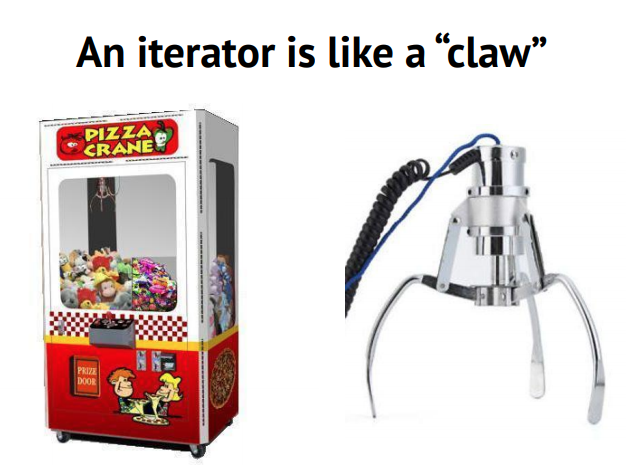CS106L(6): Arcade Toy Claw with Iterators
Enjoy Arcade Toy Claw Games?
I have tried that game some times ago, here is the evidence:
HAHAHAHAHAHAHA…..The shop owner will bankrupt soon 💸
Summary
- Understand Iterators Concept: It’s like Arcade Toy Claw Game!
- Iterator Practice: Example and Exercises
- Introduce different types of Iterators
std:vector Loop Example
std::vector<int> vector{3, 1, 4, 1, 5, 9};
for (size_t i = 0; i < vector.size(); i++) {
const auto& elem = vector[i];
cout << elem << endl;
}
Iterators
Iterators allow iteration over any container whether ordered or unordered.
Iterators (“the claw”) can:
- move “forward”
- according to some order…
- retrieve element
- check if two claws are in the same place
Containers (“the machine”) provide:
- the bounds (begin and end)

Key idea: iterator has ordering over elements, it always knows what the “next” element is.
it (the reference)
*it; (dereference, the item)
(it == c.end()) //until
Examples
std::set<T> s;
auto iter = s.begin();
iter++; // increment; prefix operator is faster (why?)
++iter;
*iter; // dereference iter to get curr value
(iter != s.end()); // equality comparison
iter = another_iter // copy construction
STL sets have the following operations:
s.begin(); // an iterator pointing to the first element
s.end() // one `past` the last element
Why use ++iter and not iter++?
Answer: There’s no need to store the old value of the iterator, so ++iter returns the value after being incremented.
Iterator Practise
What type is it?
std::map<int, int> map {{1, 2}, {3, 4}};
auto it = map.first(); // what type is this? My ans: std::map::Iterator<int, int>
auto map_elem = *it; // how about this? My ans: <int, int>
Quiz: Iterator Basics
Example Code:
std::map<int, int> map {{1, 2}, {3, 4}}; // note that dereferencing a std::map::iterator returns a std::pair
auto iter = map.begin(); // what is *iter? My ans: <int, int>
++iter; // what is (*iter).second now? My ans: 4
auto iter2 = iter;
++iter; // what does (*iter).first return? My ans: undefined
Notes:
++iter: go to the next element*iter: retrieve what’s at iter’s position- copy constructor: create another iterator pointing to same thing
- iter is a
copyof begin iterator.
auto iter = map.begin();
-
*iterreturns {1, 2} -
++iter;:*iterincremented to next element -
*iter.secondis 4 -
auto iter2 = iter;: create an independent copy of iter pointing to same thing -
last
++iter;: increment iter (iter2 not impacted…) -
what does
(*iter).firstreturn?
undefined!, because (iter == map.end())
Recall the Loop Example
std::vector<int> vector{3, 1, 4, 1, 5, 9};
for (size_t i = 0; i < vector.size(); i++) {
const auto& elem = vector[i];
cout << elem << endl;
}
Iterator Example
std::set<int> set {3, 1, 4, 1, 5, 9};
for (auto iter = set.begin(); iter != set.end(); ++iter) {
const auto& elem = *iter;
cout << elem << endl;
}
std::map<int> map {{1, 6}, {1, 8}, {0, 3}, {3, 9}};
for (auto iter = map.begin(); iter != map.end(); ++iter) {
const auto& [key, value] = *iter; // structured binding!
cout << key << “:” << value << endl;
}
Exercise: print all elements in these collections
You discovered For-Each Loop!
std::set<int> set {3, 1, 4, 1, 5, 9};
for (const auto& elem : set) {
cout << elem << endl;
}
std::map<int> map {{1, 6}, {1, 8}, {0, 3}, {3, 9}};
for (const auto& [key, value] : map) {
cout << key << ":" << value << endl;
}
Thoughts:
autoorauto&?
Seems that if it is value, auto& will be used to represent the dereference/or the content in that address, if it’s pointer/iterator, then auto will be used. Is it correct?
Iterator Shorthand
These are equivalent:
auto key = (*iter).first;
auto key = iter->first;
Types of Iterators
- All iterators are incrementable (++)
- Input iterators can be on the right side of =:
auto elem = *it; - Output iterators can be on the left side of =:
*elem = value; - Forward iterators can be traversed multiple times:
iterator a;
b = a;
a++; b++;
assert (*a == *b) // true
Q: Can you think of an example of an iterator that should not be a forward iterator?
- Random access iterators support indexing by integers.
it += 3; // move forward 3
it -= 70; // move backwards by 70
auto elem = it[5]; // offset by 5
Haha, congrats, the 6th lecture finished! Wish you good luck next time when you see this:

Famous Arcade Game!